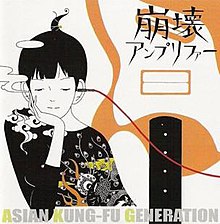Hōkai Amplifier
| Hōkai Amplifier | ||||
|---|---|---|---|---|
 | ||||
| EP by | ||||
| Released | November 25, 2002 (original) April 23, 2003 (re-release) | |||
| Recorded | 2002 at GOK Sound Studio in Tokyo, Japan | |||
| Genre | Indie rock, alternative rock | |||
| Length | 22:54 | |||
| Label | Under Flower FLOWER-047 Ki/oon KSCL-542 Spectrum SPJL-001 | |||
| Producer | Katsuhisa Ogawa | |||
| Asian Kung-Fu Generation chronology | ||||
| ||||
Hōkai Amplifier (崩壊アンプリファー, Hōkai Anpurifā, Destructive Amplifier) is the major-label debut EP by Japanese rock band Asian Kung-Fu Generation, released on November 25, 2002 on Under Flower Records.[1]
Background[edit]
After six years since its inception and three independent releases, Asian Kung-Fu Generation contributed to the Under Flower compilation album, What You Gonna Do?, before dropping their first major-label EP.[1] The critically acclaimed mini-album topped the High Line Records weekly chart for two weeks straight and peaked at number thirty-five on the Oricon indies sales chart.[2] Due to its success, Hōkai Amplifier was re-released by Ki/oon Records on April 23, 2003. Although the mini-album didn't release any singles, the intro track "Haruka Kanata" enjoyed immense domestic and international popularity after it came to be used as the second opening theme for the anime series Naruto.[3] In 2014, the album was released again as a 12-inch analog record.[4]
Track listing[edit]
All lyrics are written by Masafumi Gotoh; all music is composed by Masafumi Gotoh, except "Rashinban" by Gotoh and Takahiro Yamada
| No. | Title | Length |
|---|---|---|
| 1. | "Haruka Kanata" (遥か彼方 Far Away) | 4:02 |
| 2. | "Rashinban" (羅針盤 Compass) | 2:32 |
| 3. | "Konayuki" (粉雪 Powder Snow) | 3:46 |
| 4. | "Ao no Uta" (青の歌 Blue Song) | 3:52 |
| 5. | "Sunday" (サンデイ Sandei) | 4:03 |
| 6. | "12" | 4:36 |
| Total length: | 22:51 | |
Personnel[edit]
|
|
Chart positions[edit]
| Year | Chart | Peak positions |
|---|---|---|
| 2002 | High Line Records | 1 |
| Oricon Indie | 35 |
References[edit]
- ^ a b "Under Flower Label – Release discography". Under Flower Label. Under-flower Co., Ltd. Archived from the original on 2009-01-07. Retrieved 2008-10-09. (in Japanese)
- ^ Rhoades, Reginald (July 2004). "ASIAN KUNG-FU GENERATION". Animerica: 59. Retrieved 2008-12-14. [dead link]
- ^ "ASIAN KUNG-FU GENERATION: Hōkai Amplifier". ASIAN KUNG-FU GENERATION Official Website. Ki/oon Records Inc. Retrieved 2008-10-09. (in Japanese)
- ^ "Information - Sony Music". ASIAN KUNG-FU GENERATION. Sony Music Japan. 2014-03-03. Retrieved 2014-03-03. (in Japanese)
